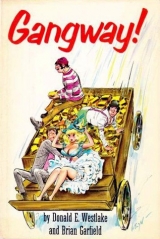
Текст книги "Gangway!"
Автор книги: Brian Garfield
Соавторы: Donald E. Westlake
сообщить о нарушении
Текущая страница: 13 (всего у книги 13 страниц)
CHAPTER THIRTY
Out in another part of the ocean the two police launches closed in on Daniel Webster. It took several minutes-and one shot across the steamer's bow-to convince the captain to slow down and listen, and then he did nothing for a while but bellow unintelligibly through a megaphone. Eventually he became calm enough to hear the questions they were asking; then he gestured violently northward, losing his megaphone over the side in the process.
The two launches veered around and went charging away to the north. The captain of Daniel Webster flung his hat after his megaphone, screamed at heaven, and went raging back to the bridge to kick his helmsman.
Farther north, the Sea Wolf was traveling south. Below, in the heat and noise and semidarkness of the bowels of the ship, Gabe was working as coal handler. Stripped to the waist, he was shoveling coal from the bin into the wheelbarrow, pushing it laboriously through the narrow corridor to the engine room-risking his knuckles along the metal walls every time-and dumping it on the small sooty pile behind Ittzy.
Ittzy was the stoker, shoveling coal into the furnace. Sweaty, dirty, also stripped to the waist, gasping for breath, Itzzy turned a broadly smiling face toward Gabe and yelled over the roar of the engine, "This is fun!"
Gabe looked at him. He panted, but had nothing to say.
"Well," Ittzy yelled, a bit less exuberantly, "it's anyway better than being locked in that back room."
Gabe turned and plodded away with his wheelbarrow.
Up on the bridge Captain Flagway was steering. The coast was to his left, San Francisco was just beyond the horizon to the south, and Baltimore was not very far beyond that. Baltimore; Daddy; the apothecary shop. After all these years.
Sea Wolf was a lean, fast, hungry ship-a pleasure to operate. Captain Flagway, for the first time he could remember, smiled.
On deck, Vangie frowned, and paused in her labors. She and Francis were packing gold ingots into small wooden boxes marked TEAK. Once all the gold was packed away, the wagon would be broken up and dumped over the side.
Still frowning, pensively gazing toward the horizon, Vangie said, "Francis?"
"Mm?"
"I want you to know," she said, "that I like you very much."
"Well, thank you," he said, surprised.
She looked at him, a sad smile touching her lips. "Very soon now," she said, "we're all going to be arrested and put away forever in separate prisons, but I do want you to know I've grown very fond of you."
Touched, Francis said, "You've been a sister to me, Vangie."
"And you to me."
"But maybe we won't be caught," he said. "We've gotten away with it so far."
Vangie sighed. "Maybe you're right," she said, without conviction.
Farther north, aboard the San Andreas, First Mate Crung was untying Roscoe in the knee-deep water in the hold, while other crewmen were doing the same for Roscoe's companions. From above, a steady malevolent ROAR could be heard.
Roscoe, free of his gag, looked up and said, "Percy's all right, eh?"
"He's a little annoyed. I figured I'd better keep him tied up a while."
"Not a bad idea," Roscoe said. Rubbing his wrists where the rope had chafed them, he looked around at the water lapping everywhere. "This damn tub's sinking," he said. "We better get to the lifeboats."
Gabe was taking a breather on deck, his place below being temporarily taken by Francis, who had insisted on finding out how, real sailors live.
Gabe and Vangie leaned against the rail, their arms around one another. Neither had much to say; Gabe out of weariness, Vangie out of pessimism.
Captain Flagway called from the bridge, "Ships ahead. Coming this way."
Gabe watched them, idly interested. "In a hurry," he said.
Vangie suddenly clutched his arm. "Police."
"Take it easy," he told her. "They're not looking for this ship. It's the San Andreas they want. That was the whole idea of the switch."
Nevertheless, he could feel how tense she was as the two police launches arrived and shot past to starboard, thundering northward. Standing up in the bow of the lead launch was a red-haired figure, straining forward. McCorkle.
Gabe frowned, watching that shock of red hair go by. "Is that bluebottle everywhere?"
"That's what I've been trying to tell you," Vangie said. "Some bluebottle is everywhere. You just can't get away, Gabe."
He looked at her, trying to keep his confidence. Rational problems he could work out, but superstitions were harder to deal with. Could she be right after all?
Then, from the bridge, Captain Flagway sang out, "There it is! San Francisco, dead ahead!"
Gabe laughed, in sudden relief. "They're not everywhere," he said, and looked out toward the distant hills of the city.
***
The police launches very nearly missed the San Andreas entirely. All that was left of her when they arrived was the gently descending top six feet of her foremast, with the Paraguayan flag fluttering in the breeze, as though somewhere beneath the surface of the water someone was holding a garden party.
Officer McCorkle, in the prow of the lead launch, removed his hat and held it over his heart. His red hair flew and flickered in the breeze, like an answer to the Paraguayan flag.
The two launches circled the sinking ship. The mast settled slowly, as bubbles popped to the surface here and there. The flag dipped, wetted itself, wrapped itself dankly around the mast, and disappeared at last into the sea.
Officer McCorkle replaced his hat. Then he took out his notebook, flipped through it, studied an entry here and there, shook his head, and tossed the notebook into the ocean.
CHAPTER THIRTY-ONE
Up the dusty slope toward Francis's gold mine came a large wagon full of small boxes marked TEAK. Ittzy was driving, and Gabe was sitting on the high seat beside him, smiling around at the countryside. Captain Flagway was perched atop the cargo with his braided cap at a jaunty angle and half-full flask of whisky dangling from his hand. Francis and Vangie rode a brace of matched white horses beside the wagon.
The sun shone. Birds sang. An occasional rabbit hoppity-hopped across the green and sunny landscape.
They arrived at the entrance to the mine, and all dismounted. Francis said, "I can't help it, you know, I just have trouble absorbing this. We're bringing gold to a gold mine."
"That's right," Gabe said. "And we're going to start selling it right back to the Mint again, one bar at a time." He turned to give Vangie a big grin and say, "Unless you still think we're gonna get caught."
She looked all around in the sunlight, frowning and squinting as though baffled by the non-appearance of the United States cavalry. "I just can't understand it," she said. "How can the Government let a thing like this happen?"
"I guess they must be thinking about something else today," Gabe said.
Captain Flagway leaned against the wagon and toasted the world at large with his flask. A crumpled smile was on his lips and a sputtering gleam in his eye. "Oh, happy day," he announced. "At last I'll be going back to Balsi… Balder… Baltimore!"
Gabe grinned at him. "That's right, Captain," he said. "You're on your way."
"Well on my way."
Vangie, trying not to show her emotions on the surface, said, "Well, Gabe, I guess you'll be on your way, too. Back to New York."
"New York." Gabe smiled faintly in reminiscence, then frowned a bit, gazing out over the hills toward San Francisco. Wisps of fog were beginning to drift through the valleys with the approach of sunset. "Old Twill," Gabe said, thoughtfully. "You know what the trouble with Twill is?"
Vangie didn't care what the trouble with Twill was. She wanted to know what the trouble was with Gabe Beauchamps. "No, I don't," she said.
"He doesn't understand where the future is. Life is moving West, Vangie. This is where the future is… right out here."
She couldn't believe her ears. "Do you mean that, Gabe?"
"I'm kind of getting used to things out here," he said.
"You are?"
"The slower pace, the small-town life." He shrugged. "San Francisco isn't too bad, for a yokelville."
Francis said delightedly, "Gabe, you mean you'll stay?"
"The burg has possibilities," Gabe said. "I might invest here."
"The cancan shows," Francis said. "They're going to open again, I got inside word. You could…"
"No," Gabe said thoughtfully, "I don't think so."
"Oh, yes, Gabe!" Vangie cried. "Show business!"
"The cancan shows," Francis said, "are the wave of the future. A man could get in right now on the ground floor. That's what I'm doing with my share, becoming an entrepreneur."
Vangie clutched Gabe's arm. "Oh, Gabe, say yes!"
"I just don't think so," Gabe said.
Vangie frowned at him, bewildered again. "Well, what, then?"
"I've been thinking," Gabe said, "about real estate."
"Real estate?" Vangie looked around, looked back at Gabe again. "You mean houses?"
"No, land."
"But all the land in San Francisco is already built on."
"Outside town," Gabe said. He nodded, agreeing with himself. "Across the Bay, I think."
"Across the Bay?"
"Land should be cheap over there."
Vangie said, "Well, of course it's cheap. There's no way to get to it, nobody wants it."
"Some day," Gabe said, "there'll be a bridge across the Golden Gate."
Vangie stamped her foot in impatience and disbelief. "For Heaven's sake, there will not!"
Francis said, "I do doubt that, Gabe, you know. That's far too wide for any bridge."
"I think they'll do it anyway," Gabe said. "Put a bridge right across. And then that land up there… What's it called, anyway?"
"Oh, who knows!" Vangie cried.
"Marin County," Francis said. "But Vangie's right, Gabe, that land up there won't be worth much. Now, the cancan shows…"
"No," Gabe said. He just had a feeling deep down inside that he was right. "Land," he said.
"I'm going to open a chain of discount stores," Ittzy said. "And never clerk in any of them."
"I'll stick to land," Gabe said.
"Oh, Gabe," Vangie cried, at her wit's end. "You've done everything right, you got away with the robbery even though you shouldn't, and now you're just going to throw it all away."
"Land," Gabe said.
"You never listen!"
Gabe nodded. "That's right," he said.
He gazed out over the raw new countryside; his countryside now. Vangie and Francis talked to him, argued with him, pleaded with him-but he never listened.
ABOUT THE AUTHORS
BRIAN GARFIELD lives in the pre-1900 general store of Alpine, New Jersey with his wife, English actress Shan Willson, and a platoon of dogs and cats. The thirty-four year old Arizonan has been a jazz musician, a college instructor, and a reluctant soldier. He has lived in many places from San Francisco to Paris, and has written several well-received novels ranging in subject matter from Wall Street to the Old West. Described by the New York Times as a "virtuoso," he is the author of the non-fiction study The Thousand Mile War, as well as the recent suspense thriller Death Wish which has become a "cult" book and will soon appear as a United Artists film. A former president of the Western Writers of America, Mr. Garfield reports that shortly before writing his half of Gangway he was caught cheating at cards and was shot by Donald E. Westlake with a .32-caliber poker chip.
DONALD E. WESTLAKE was born in a filling station near Aardvark, Oklahoma, early in February. Attending public schools in Pittsburgh, Akron, and Sinking Province, he took his degree in elliptical engineering from the Brooklyn Academy of Music late in June. Mr. Westlake has operated a bootleg yellow pages factory in Detroit, panned for gold in Albania, and was the copywriter responsible for the unintentional double meaning in the Prune Whip Yogurt advertising campaign of 1966-67. Turning to writing after his left leg was bitten by an alligator in the New York City sewer system, Mr. Westlake has addressed himself to the central concerns of our troubled times with all the verse and passion with which he pursued his earlier, more active career. His first novel, Sprigs of Eiderdown, won the coveted Prix Fixe, the most prestigious literary award ever offered by the city of Marseilles. Many of his tales of adventure have been made into television playlets without his knowledge or consent. He makes his home in a converted bathysphere in Lake Como, Switzerland, and has never paid any income tax.








